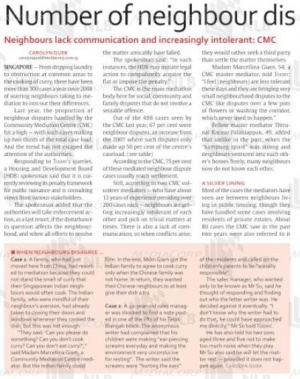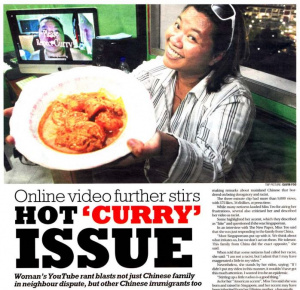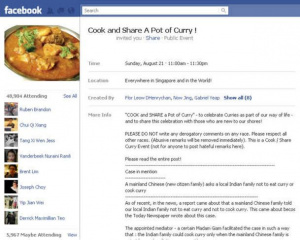Curry dispute (2011)
On 8 August 2011, TODAY reported on a Community Mediation Centre (CMC) case that involved a Chinese and an Indian family.[1] The CMC is a body under the Ministry of Law in Singapore.[2] The Chinese family had filed a complaint against their Indian neighbours over the smell of curry. According to the Chinese family, the Indian family cooked curry regularly. The mediator ruled that the Indian family could only cook curry when the Chinese family was not at home.[3] This ruling sparked reactions from the Singaporean online community where many were unsatisfied.
Details of the incident

TODAY report
In the 2011 TODAY report by Carolyn Quek, it was revealed that the Chinese family had recently migrated to Singapore from mainland China.[4] They were not accustomed to the smell of Indian curry and found it unpleasant. They then reported their issue to the CMC whose mission is:
"To provide an attractive, practical and convenient solution for social and community disputes in Singapore".[5]
The TODAY report also stated that the Indian family were already aware of the Chinese family’s complaints and had taken active measures to minimise the smell.[6] These measures included closing their windows and doors whenever they cooked the dish.
CMC mediator's ruling
However, these measures were reportedly insufficient in solving the issue. The Chinese family had asked the Indian family to not cook or eat the curry at all.[7] The Indian family disagreed with these requests and the case was concluded through the mediator’s ruling.[8]
The settlement reached was that the Indian family could only cook curry when the Chinese family was not at home. In return, the Chinese family was expected to try the dish.[9]
Clarifications
As the event unfolded, it was revealed that the curry dispute case occurred seven years ago in 2004.[10] The following players spoke up to clarify the issue: Then Minister for Law K Shanmugam, the Editor of TODAY Walter Fernandez and the CMC.
| Players | Clarification(s) | Refs. | Conclusion |
|---|---|---|---|
| K Shanmugam | The incident occurred in 2004 and not in 2011. | [11] | The 2004 curry dispute was mistakenly reported as a recent incident in 2011, causing discontent among netizens at the time. |
| Water Fernandez | The 2004 curry dispute reported by TODAY in 2011 was meant to be an example of the cases handled by CMC. | [12] | |
| Community Mediation Centre (CMC) |
|
[13] |
Public responses
Netizens

The CMC ruling drew flak from Singapore's online community. Netizens believed that the settlement was skewed towards the Chinese family and promoted cultural intolerance.[14] Some netizens expressed that since the Chinese family were foreigners, they should have been the ones to adapt.[15]
On 14 August 2011, netizen Michelle Teo uploaded a 3-minute long video on YouTube titled ‘Please Respect Curry’. In her video, she criticised the Chinese family for being intolerant of their Indian neighbours’ cultural practices.[16] The video garnered 9,000 views, 375 likes and 34 dislikes in three days. The video (YouTube video) had been reposted by YouTube user Alexandria School of Science on 14 August 2014.
On the other hand, some netizens urged Singaporeans and foreigners to display mutual respect and encouraged Singaporeans to be less xenophobic.[17]
On 11 August 2011, netizen Florence Leow created the Facebook page ‘Cook and Share a Pot of Curry’.[18] The page rallied Singaporeans to cook curry on 21 August 2011, garnering over 57,600 members in 2011.[19] On the day of the campaign, Florence prepared Peranakan style chicken curry, Indian vegetable curry and Japanese curry. Eleven people were invited to her home in Toa Payoh East to share the curry, some of whom were newly-arrived migrants.[20]
Three presidential candidates for the 2011 presidential elections, Dr Tan Cheng Bock, Mr Tan Jee Say and Dr Tony Tan also joined in the campaign.[21] Dr Tan Cheng Bock expressed his views towards the incident, stating that when one chooses to come to Singapore, they essentially also choose a "multiracial lifestyle".[22]
Legacies
One Hour to Daylight (2016)
The local film ‘One Hour to Daylight’ was released in 2016. The film was partly inspired by the curry dispute. The film's first scene featured a Chinese lady scolding her Indian neighbours for cooking curry.[23]
The film’s creative producer Nicholas Chee stated that the curry incident sparked "discussion of xenophobia and racism" which fit in with the overarching theme of the film.[24] ‘One Hour to Daylight’ was a part of the Singapore Writers Festival’s 2016 programme. It was screened at Golden Village's Suntec City theatres on 19 and 25 September 2016.[25]
Curry Carnival (2016)
In 2016, a group of ITE College West students initiated a neighbourhood curry-cooking competition under the Housing Development Board's Good Neighbour Project. The event was well-received with approximately 300 attendees.[26]
References / Citations
- ↑ Moore, Malcolm. “Singapore's 'anti-Chinese curry war’”. The Telegraph. August 16, 2011. Accessed on 13 February 2019.
- ↑ Kaifong. “Shanmugam clarifies ‘curry issue’”. YahooNews. August 17, 2011. Accessed on 13 February 2019.
- ↑ Moore, Malcolm. “Singapore's 'anti-Chinese curry war’”. The Telegraph. August 16, 2011. Accessed on 13 February 2019.
- ↑ Quek, Carolyn. “WHEN NEIGHBOURS DISAGREE”. TODAY. August 8, 2011. Accessed on 13 February 2019. Retrieved from NewspaperSG.
- ↑ "Mission and Logo". Community Mediation Centre. Accessed on 29 May 2019.
- ↑ Quek, Carolyn. “WHEN NEIGHBOURS DISAGREE”. TODAY. August 8, 2011. Accessed on 13 February 2019. Retrieved from NewspaperSG.
- ↑ Quek, Carolyn. “WHEN NEIGHBOURS DISAGREE”. TODAY. August 8, 2011. Accessed on 13 February 2019. Retrieved from NewspaperSG.
- ↑ Quek, Carolyn. “WHEN NEIGHBOURS DISAGREE”. TODAY. August 8, 2011. Accessed on 13 February 2019. Retrieved from NewspaperSG.
- ↑ Quek, Carolyn. “WHEN NEIGHBOURS DISAGREE”. TODAY. August 8, 2011. Accessed on 13 February 2019. Retrieved from NewspaperSG.
- ↑ Kaifong. “Shanmugam clarifies ‘curry issue’”. YahooNews. August 17, 2011. Accessed on 13 February 2019.
- ↑ Kaifong. “Shanmugam clarifies ‘curry issue’”. YahooNews. August 17, 2011. Accessed on 13 February 2019.
- ↑ Ng, Jing Yng. “Shanmugam clears up 'curry issue', praises unity and identity shown”. TODAY. August 17, 2011. Accessed on 13 February 2019. Retrieved from NewspaperSG.
- ↑ Kaifong. “Shanmugam clarifies ‘curry issue’”. YahooNews. August 17, 2011. Accessed on 13 February 2019.
- ↑ Moore, Malcolm. “Singapore's 'anti-Chinese curry war’”. The Telegraph. August 16, 2011. Accessed on 13 February 2019.
- ↑ Moore, Malcolm. “Singapore's 'anti-Chinese curry war’”. The Telegraph. August 16, 2011. Accessed on 13 February 2019.
- ↑ Lim, Alvin. “Online video further stirs hot 'curry' issue”. The New Paper. August 17, 2011. Accessed on 13 February 2019.
- ↑ Suhartono, Harry. “Singaporeans' culinary anti-immigration protest: curry”. Reuters. August 22, 2011. Accessed on 13 February 2019.
- ↑ Suhartono, Harry. “Singaporeans' culinary anti-immigration protest: curry”. Reuters. August 22, 2011. Accessed on 13 February 2019.
- ↑ Suhartono, Harry. “Singaporeans' culinary anti-immigration protest: curry”. Reuters. August 22, 2011. Accessed on 13 February 2019.
- ↑ “United over curry”. The Straits Times. August 22, 2011. Accessed on 13 January 2020. Retrieved from NewspaperSG.
- ↑ “United over curry”. The Straits Times. August 22, 2011. Accessed on 13 January 2020. Retrieved from NewspaperSG.
- ↑ “United over curry”. The Straits Times. August 22, 2011. Accessed on 13 January 2020. Retrieved from NewspaperSG.
- ↑ Lui, John. “Curry dispute and Singapore writing inspires film One Hour To Daylight”. The Straits Times. September 15, 2016. Accessed on 13 February 2019.
- ↑ Lui, John. “Curry dispute and Singapore writing inspires film One Hour To Daylight”. The Straits Times. September 15, 2016. Accessed on 13 February 2019.
- ↑ Lui, John. “Curry dispute and Singapore writing inspires film One Hour To Daylight”. The Straits Times. September 15, 2016. Accessed on 13 February 2019.
- ↑ Yeo Sam Jo. "Curry carnival brings residents together". The Straits Times. June 30, 2016. Accessed on 13 January 2020.
